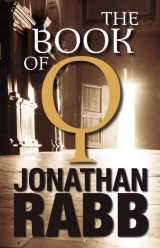
Текст книги "The Book of Q"
Автор книги: Jonathan Rabb
Жанр:
Триллеры
сообщить о нарушении
Текущая страница: 6 (всего у книги 28 страниц)
Leaving the banter aside for the moment, he asked, “So, if they were earlier, that means they would have died out by the time ‘Perfect Light’ was written?”
“Oh, no,” she answered. “Most of the silver and gold markets in Basra and Baghdad today are run by Mandaeans. In fact, I once spent a very wonderful afternoon with one of their nasuraiyi, a ‘guardian’ of the secret rites and knowledge.” Her eyes stopped momentarily on a spot on the rug. “Fascinating man. Tried to explain the five realms of light. Absolutely incomprehensible.” She looked up with a smile. “It’s just that seeing the Syriac with illustrations-well, it’s a very odd choice. Naturally it makes one think of the Mandaeans.” She drew up next to him and again began to scrutinize the scroll.
“Naturally.” He now remembered how essential such digressions were to her work-essential, if equally incomprehensible. It was best to let her mind range as it saw fit. “So you don’tthink it’s linked to the Mandaeans?” he asked.
“Of course not.” She looked up. “Why do you ask?”
Now Pearse smiled. “No reason.”
She turned again to the parchment. It was time to get down to business. Within seconds, she was translating as she read: “‘It is from the perfect light, the true ascent that I am found in those who seek me. …’” She let the words trail off as she seemed to reread the section to herself. “That’s some sort of preamble,” she continued. “There’s a section missing here, and then it goes on: ‘It is I who am the riches of the light; it is I who am the memory of the fullness. And I traveled in the-’” She stopped and bent closer in to get a better look, her eyes now scanning the next few lines, lips always moving silently. Pearse noticed another large tear just below her finger on the glass. “That’s odd. This bit comes right out of the ‘Secret Book of John,’ the ‘Poem of Deliverance,’ at least in these first few lines.” She read on. “There’s another section missing here, and then it runs, ‘And I traveled in the darkness …’ something about a prison, and then picks up again here with ‘And the foundations of chaos moved.’”
She stood upright, her eyes still on the scroll. “That’s the Book of John all right. A Syriac version of the Gnostic Greek, but definitely John.” She turned to Pearse. “I’m sure I could find a better translation of it; wouldn’t be much help, though, I don’t think. My guess is that the writer used it to set the tone, establish a link-although why he connects ‘Perfect Light’ with John …” Her words once again trailed off as she leaned in over the glass. “That isn’t clear at all.”
“Right,” said Pearse hesitantly. “Actually, the Manichaeans might not be the only ones traveling in darkness here.”
“What?” She looked up, clearly having been listening with only half an ear.
He smiled. “I think I missed class that day.”
“Oh … I would have thought with Ambrose, you would have-” She cut herself off. “Or maybe not.” She smiled, the teacher trying to find the right words. “I suppose it’s all rather … obscure, isn’t it?”
“A little earlier than my period, that’s all.”
“Always a good excuse.”
“Then I guess I’ll stick with it.”
“Fair enough”-a cigarette back in her fingers-“No reason you should be familiar with any of this.” She looked up at him, the smile in her eyes growing to a twinkle. “Well, is it to be the introductory lecture, or just the highlights, Father?” Once again, she left him no time to answer. “I suspect just the highlights.”
She stepped away from the glass, turned, and sat on the lip of the desk. “Let’s see,” she began, taking a long drag, gesticulating with the cigarette to emphasize each point. “Dating. … John is written sometime in the first or second century, so it’s a contemporary of the canonical Gospels; it’s a Gnostic tract and therefore a threat to what would become orthodox Catholicism; it recasts the Genesis myth with God as a mother-cum-father entity prior to the God of the Hebrew Bible. …” Another long draw on the cigarette, her eyes now searching the air, the delivery no less staccato. “It focuses on self-knowledge and condemns the institutionalization of faith; it’s supposedly written by one of Jesus’ original disciples-John, the son of Zebedee-and purports to record the words of Christ Himself; and it’s done in the narrative style of what was called an ‘apocryphal act of the apostles,’ a sort of Christianized novel.” One last puff before she turned to crush the butt into the ashtray, speaking as she drove the cigarette deeper into the ash. “The poem is simply one section of the book, an explanation of how one might be able to achieve deliverance by reclaiming uncontaminated, or perfect, light.” She looked up. “So there you have a link to the Manichaean prayer. A tenuous one, but a link.”
Still trying to piece everything together, he asked, “And all of that makes John and its poem a typical Gnostic tract?”
“On a very fundamental level,” she replied, “yes. It’s one that conveys a secret knowledge-directly from Christ-which the initiated elite access in order to achieve an enlightened existence. Gnosticism at its most basic.”
Feeling a bit bolder, he added, “And once the four Gospels are canonized, it slips into obscurity, along with the rest of the Gnostic scriptures.”
“Well, shovedmight be a better choice of words. Remember, at the end of the second century, the followers of Jesus-in all their myriad sects-were fighting for their lives. They needed to put up a unified front, rather difficult, given the number of gospels and apostolic letters making the rounds. Which meant internal debates among them ultimately amounted to a matter of survival, rather than theology.”
“Expedience over spirit.” Pearse nodded. “Kind of takes the sheen off of things, doesn’t it?”
“Reality has a way of doing that, yes,” she said.
“Glad to see you’re not sugarcoating it on my account.”
“Wouldn’t dream of it.”
He smiled. “I could hide all the ashtrays.”
Another little chuckle. “I have them in places you wouldn’t begin to think of.”
He started to respond, then thought better of it. “So they needed one interpretation to stand supreme against the common Roman enemy, is that it?”
“Yes … but not just an interpretation. The early Catholic church needed a structure that could bring the faithful together. Something to turn the ‘followers of Jesus’ into ‘Christians.’ The ‘Jesus movement’ into ‘Christianity.’ Gnosticism defied any kind of structure and therefore made its believers difficult to control. No control, no unified front. You see where I’m leading?”
“To the end of Gnosticism.”
“Exactly. Anti-Gnostic writings became one of the standards of the new orthodoxy, most famously from the pen of the Bishop of Lyons, a man named Irenaeus. He wrote several books. …” She stopped for a moment, her eyes again searching the air. “What was the big one? The Overthrow? The Destruction?Something about ‘false knowledge.’” She looked back at him. “Whatever it was. It condemned all Gnostic gospels as heresy, and in so doing, helped to root out any internal squabbling. You had a common front.” She seemed to have expected a bigger response from him; he obliged with an exaggerated nod.
“Thank you. At the same time, though,” she continued, “that standard asserted an image of Christ that may very well have been different from the figure of Jesus His earliest followers had known. A shift. We, of course, will never really know.”
“A different image of Christ?” For the first time, Pearse responded not as student. “I’m not sure I understand that.”
Angeli smiled. “I don’t mean to make you uncomfortable, Father.”
“Yes, you do.” He smiled. “What shift?”
“Oh, I didn’t say there was a shift. I said there mighthave been a shift. No one’s absolutely certain how people understood Jesus in those first few centuries. Too many versions of the Word floating around. There’s Paul, the Gospels, the Gnostics, any number of Jesus sects-”
“Right, right,” he cut in. “But there has to be a way to distinguish Catholic orthodoxy from Gnosticism? One Christ from another?”
“Naturally. We’re just not sure which one is the authentic Christ.”
“I understand. But the differences-”
“Are there. Yes.” Evidently, this part of the discussion required a fresh cigarette. She fished through her pocket and produced yet one more from a seemingly endless supply. “I say all of this purely as an academic, Father, sugarcoating or not. As a Catholic-”
“Don’t worry, you’re absolved.”
Angeli returned the smile, then lit up before diving back in. “Well then, two basic distinctions separate an orthodox and a Gnostic image of Christ. First, orthodox Catholics view God as a completely separate entity. Primal Other. We can venerate Him, attempt to mirror His life and piety, but we can never achieve a synthesis with Him. The Gnostics, on the other hand, claim that self-knowledge-the highest form of attainment-is actually knowledge of God. So, self and Divine become identical at a certain point of self-awareness.”
“That’s sounds like a very Eastern view of spiritual growth,” he said.
“On some level, it is.”
“And the second point?”
“Also somewhat Eastern. And politically far more explosive. For orthodox Christians, the ‘living Jesus’ speaks of sin and repentance. At His core, Christ is Savior, hence the need for His death, our sins, and His Resurrection. And that Resurrection is a literal one, confirmed by Peter. Without that doctrine, without Peter standing there saying, ‘I was the first, I can vouch for His return, He gave me the keys and told me to tend to the sheep, and so forth and so on,’ there’s no need to have a group of men-the leaders of the church-sustaining that confirmation. In other words, without the doctrine of bodily resurrection, there’s no way to validate the apostolic succession of bishops. No way to lay claim to the papacy.”
“That’s a little troubling, isn’t it?”
“You might say that. For Gnostics, on the other hand, Jesus speaks of illusion and enlightenment. They reject a literal Resurrection altogether. So Christ becomes guide. Once again, a dramatic shift in the relationship occurs when the disciple achieves enlightenment. Jesus is no longer spiritual master. Instead, the two become equals through their knowledge. Self and Divine are identical. Hence, there’s no need for a resurrection or a papal authority, with its subsequent structure. Even the few Gnostic tracts that hint at a Resurrection have Jesus appearing to Mary Magdalene first, not Peter. Imagine what that would have done for the papal succession? Pretty powerful stuff.”
“So Gnosticism humanizes Christ?”
“No.” Angeli shook her head. “It elevates human self-awareness to a deified status, and places the responsibility to achieve that status on the individual’s shoulders. Jesus remains elevated. It’s just now, He might not be alone.”
“So we all become God?” Pearse asked somewhat skeptically.
“No, I don’t think that’s right,” she said, this time a bit more thought before answering. “We all attain the knowledge, but Christ remains Christ. It’s just that our relationship with Him is … not so distant. I can’t think of a better way to put it.”
“It sounds like you’re saying we don’t need a church.”
For the first time, she hesitated. “On a concrete level, I suppose … yes.” She seemed unsure of her answer, needing to convince herself. “Yes, I think that would be right. On a spiritual level, though, it’s far more complex.”
“Self-awareness was the only guide a Gnostic needed.” Pearse was getting caught up in the idea. “No structure. Nothing to get in the way. An individually impassioned link to Christ. Pretty nice setup.”
“As I said, to a greater or lesser extent. But don’t forget, they never abandoned their commitment to faith. Or to Christ as the Messiah.”
“Right, right. But it was a pure, unfettered faith.” His eyes began to drift to a distant point.
“Yes.” She noticed his expression. “Father?” She waited until she had his attention. “I’m sure some of this offends you. I don’t mean to-”
“Not to worry.”
“You’re sure?”
“When I start humming and covering my ears, you’ll know I’ve had enough.”
“Anyway, you can see why orthodox Christianity needed to suppress it. It was their need for control. …” She stopped herself; best to leave the thought unfinished with a priest in the room, no matter what he might have said to the contrary. After several moments, she stood and turned back to the scroll. “None of that, however, helps to answer the question: Why put the Gnostic John at the beginning of a Manichaeanprayer? Mani might have started out as a type of Gnostic, but he didn’t end there.” She turned to Pearse. “There are significant differences.”
“Maybe it had something to do with the oral tradition. Something the scribe’s own congregation said before chanting the prayer?”
A dismissive snort of air accompanied a quick shake of her head.
“I’ll take that as a no.”
“Unless he went counter to everything we know about liturgical transcription,” said Angeli, “of course not.”
“I preferred the snort.”
“I thought you might.” Within seconds, she was back with the parchment, her lips once again moving silently. “Here, you see, it goes off onto something entirely new.” Without warning, she suddenly stepped away from the desk and headed for one of the bookshelves. Pearse was left to watch as she began to scan row after row, her plump little finger moving anxiously through the air, until, with a jab, she turned to him. “You’re tall enough. It’s the green one on the fourth shelf, two in from the end.” Half a minute later, they had the book at the desk. She flipped through several pages, a little hum to accompany her wanderings; each time, she returned to the parchment with a short “No” before moving on. After six or seven such dismissals, the hum almost a constant, she closed the book and laid it distractedly on a pile behind her. “Odd,” she said, as she made her way back to the shelf; another retrieval by Pearse, another few minutes rejecting theories, one more on the growing pile of discarded texts. The next time at the shelf, she decided to take six books at once, with Pearse left to stand silently by while she hummed through each of them, her expression never drifting beyond the slightly intrigued. He guessed she would have made an excellent poker player. Finally, after nearly ten minutes, her eyes shot up. The look on her face was one of genuine shock. Pearse moved closer.
“The coffee!” she blurted out, and scurried along the central path and out of the room before he could respond. Only then did he fully recall what it was like to work with Cecilia Angeli. Always best to give her a wide berth. In fact, he’d begun to think it might be equally smart to let her spend some time alone with the parchment. There was very little he could add to her investigation, except as a distraction.
A day or so would also give him the chance to bone up on his Gnostic and Manichaean literature. A chance to feel more comfortable with the scroll before following its lead, whatever that might entail. A different image of Christ. Something so tempting in that.
More than that, it would give him time to try to find out what had happened to Dante.
Before she had returned with the coffee, Pearse decided he would leave the scroll with her, tell her nothing of Ruini or Dante, nothing of the monk’s warning, and ask her only to keep the scroll’s discovery to herself. He knew she wasn’t someone to weather a visit from Vatican security all that well. Best to keep her out of range.
He also knew it was an unnecessary request. Angeli was famous for keeping everything close to the chest until she had pieced together the details. Hers was a professional insecurity at its most charming, if extreme. She’d insisted he approach Ambrose that way; it would be no different here.
She reappeared at the door, a tray of coffee and biscotti in hand, an empty chair serving as surrogate table. She began to pour.
“Just a quick cup,” he said, “and then I should probably let you get some sleep.”
“Sleep?” She laughed. “You think I’m going to get any sleep tonight? Why do you think I made the coffee? No, Father, we both know that’s not the way I work. You’ve brought me a new toy; I want to play with it.”
“And we also know that I’d only be getting in the way.”
She handed him a cup, then took one of the cookies. With a little smile, she said, “Yes, that’s probably true.” After a healthy bite, she added, “Your friend won’t mind if I spend some time with it?”
“Absolutely not.” Pearse took a sip of the piping espresso. “Of course, if you find anything more than just odd-”
“I’ll get in touch with you at once. Of course.” She had taken her cup and another biscotti back to the desk, a tiny space between dome and edge all that was left for both. “You, after all, were the one to bring it to me.” Another bite of the cookie. “I suspect I’ll have something in the next few days. As you know, I like to work … alone, so I take a bit longer.”
“I’ll try and remember the access codes from last time,” he said with a smile.
“It wasn’t that bad, was it?”
“The results are always worth it.”
“You’re such a nice priest. Still, it’s a shame. …”
Half a cup of espresso later, they stood at the door, Angeli clearly eager to get back to her “toy.” The good-byes were brief.
By quarter past twelve, he stood on the Ponte Garibaldi, a starry sky having all but swept away the mist and rain, a hint of cool air off the water a belated apology for the day. He let the breeze sift through his hair and clothes as he walked, the sound of the Tiber constant as his own pace. He stopped for a few moments at the apex of the bridge, lights from each bank streaming onto the edge of the water, never, though, infringing more than a few yards, a narrow strip of deep velvet at center. Pearse stared out at the abyss, caught up in its imagined emptiness.
Light and darkness, he thought. The simplicity in contrast somehow so comforting.
The vigilanzaat the gate seemed surprised by his late return. Priests-even those without collars-were usually in bed at this hour. Pearse didn’t recognize a single face as the guards gave both him and his identification a thorough examination before letting him through. The unfamiliarity evidently mutual, they continued to watch him as he made his way to the archway.
The change in weather had somehow eluded the Vatican, a dusty drizzle pressing at him as he walked up to his entryway. With no Jesuit to evade this time around, he managed the door with ease, the light from the foyer slipping into dim haze as he mounted the steps; the third-floor corridor waited silently. Trying to mirror its stillness, he tiptoed toward his room, gingerly pulling the key from his pocket before easing it into the lock. Inside, he slowly pressed the door shut, then placed the key on a side table.
“Quarter to one,” came a voice from somewhere behind him. Pearse spun round, his eyes as yet unaccustomed to the dark, the striped shadows streaming in from the windows as he tried to pinpoint the unseen speaker. “That’s rather late, isn’t it?” His first inclination was to reach back for the door handle, but a figure suddenly appeared at his right, a large hand spread wide across the center of the door. Pearse turned back into the room, his eyes now clearer, the outline of a figure seated by the far window, another at its side. From his chair, the man flicked on a nearby table lamp. “Why don’t you have a seat, Father?”
One by one, Pearse stared at the men, all three in dark suits. “How did you get in here?” he asked.
Stefan Kleist, still seated, reached into his jacket pocket and pulled out a small wallet. He flipped it open to reveal an identification card. “Vatican security,” he answered.
The man in the chair was smaller than the others, far less overpowering, yet clearly more menacing. Or perhaps it was the accent, thought Pearse. The precision of an Austrian German as he articulated English; he couldn’t tell. “I wasn’t aware that gave you permission to enter a priest’s private apartments in the middle of the night.”
“Only under certain circumstances, Father.” Kleist seemed strangely deferential, far less snide than with his initial quip.
“And that usually entails waiting around for one of them to return?”
“Why don’t you have a seat?”
Pearse remained by the door, aware that the room had changed subtly since he’d last seen it. The books were back on the shelves, no longer on the floor by the sofa, the plate of cheese altogether gone. The ball was back in his glove. Someone had decided to clean up-perhaps too well-after what had no doubt been a painstaking overhaul of the apartment. He glanced once more at the man nearest to him-at least six foot seven, eyes vacant, no need to threaten, his frame imposing enough. Pearse slowly moved to the sofa and sat. A vicarious sense of deja vu swept over him.
“Where’s the scroll, Father?” asked Kleist.
The man’s candor momentarily caught him off guard. Not that he had any idea what they thought they would find in it; still, given Dante’s experience, he had expected a bit more finesse. “Scroll?” he replied.
“Tonight’s not the night to play games.” Kleist’s expression remained unchanged, his tone enough to convey his impatience. “You saw the monk at Ruini’s funeral.”
“How did you know-”
“Do you often go out without your collar?” Kleist continued, producing the thin strip of white material from the tabletop. “Or is that only when you’re in a rush?” Pearse said nothing. “What were you in such a hurry to find?” He waited, then asked again. “The scroll, Father-where is it?”
Pearse kept his eyes locked on the small man, trying not to display any of the panic mounting in his chest. He became acutely aware of the silence, second after second slipping by, until he heard the sound of a distant voice break through. “Don’t you mean statuette?” Pearse was still staring, amazed that the words had come from his own mouth. He watched as a hint of uncertainty crept across the Austrian’s eyes.
“What?” asked Kleist.
“Dante said there was some question of provenance,” Pearse continued, no less stunned at the ease with which he let the words slip out. “That the monastery’s claim was prior to the Vatican’s.”
“What are you talking about?”
“The fertility god he found in the catacombs. The statuette.” He seemed to be gaining momentum. “He said you’d be eager to get your hands on it, although I’m not sure he thought you’d go to these lengths. Isn’t that what this is all about?”
Kleist said nothing for several seconds, his gaze fixed on Pearse. When he finally spoke, precision once again laced his words. “This is much simpler than you seem to understand, Father.” He paused, then continued. “We both know the monk never mentioned a statuette. Or any questions of provenance. He told you about a scroll.”
Again, Pearse said nothing, the Austrian evidently willing to wait.
After nearly a minute, however, his patience had grown thin. He began to nod. “All right,” he said, getting to his feet and buttoning his jacket, “then let’s go and see this statuette of yours.”
“What?” blurted out Pearse, trying to maintain some semblance of calm. “Now?”
“Yes, now, Father,” he replied, standing patiently in front of his chair. “If it’s where you say it is, then we’ve made a terrible mistake, and you have our apologies.” The delivery was devoid of any emotion. “If not, then we’ll have to start all over again.”
Nothing in the words approximated what Pearse saw in the eyes staring back at him. Eyes that made it abundantly clear why the smallest of the three was issuing the commands. And it had very little to do with the accent. Remember the monk; remember the terror in his voice. With only a glance, the man had said as much.
Pearse’s tone was far less controlled when he spoke. “Look, I’m a priest-”
“A Vatican priest,” Kleist reminded firmly, without raising his voice. “Which places you under our jurisdiction.”
“I’m also an American-”
“In an independent nation-state that houses no embassies.” He let the well-practiced words sink in. “Vatican City recognizes no claims by foreign states to infringe upon the sovereignty of His Holiness, the Pope. As representatives of that sovereignty, we are equally unrestricted in our handling of those who claim citizenship within its walls.” He waited, then continued. “The statuette, Father.”
A nervous courage surged to the fore. “And what if I refuse to show you where it is?”
“Why would you do that?” he asked, again with no trace of emotion. “As I said, we’re interested in a scroll. You show us this statuette of yours, and we’ll have nothing more to talk about.”
Pearse suddenly realized how well the man from security had played him. He tried to maintain his edge. “Except your apology.”
For some reason, Kleist allowed himself a grin. “Yes, Father. Except that.”
“This can’t wait?”
“No.” The grin was gone. “It can’t.”
With a nod from Kleist, the man across the room opened the door and stepped outside, waiting in the hall for the others to emerge. At the same time, the second man moved behind the sofa, again no need to threaten, his size more than enough to prompt Pearse to his feet. Kleist took a step closer to his quarry, then motioned for Pearse to join the man in the corridor.
No choice. No options. Whatever strands of reasoned argument Pearse had clung to now began to swirl in his head at a feverish pace. Vatican priest. The attribution had never sounded so threatening. He felt an overwhelming wave of panic sweep through him as he started for the door.
The closer he got to the corridor, however, the more his panic seemed to surrender to a feeling of supreme isolation, a sense that he was somehow removed, floating above it all, monitoring the entire episode from some distant point-its effect numbing. Under its ever-deepening sway, Pearse began to experience a kind of detached lucidity, his mind suddenly uncluttered by the frantic search for escape of only moments ago. His legs simply moved.
At the door, he watched himself as he calmly stopped and turned back to his captor. “I’ll need the map,” he said, the voice clearly his own. “Dante drew one up so I could find it.”
Kleist, growing impatient with the ongoing charade, seemed unaware of the almost mesmeric quality in Pearse’s voice and body. “So you could find the statuette?” he asked, the first tinge of anger in his voice.
“No,” answered Pearse. “The scroll.”
For an instant, Kleist didn’t know how to respond. He’d expected the priest to play it out, maintain the ruse until its futility prompted the all-too-familiar lapse into hysteria-more often than not, once inside the car. He’d seen that sort of captivity work wonders in the past. And yet, this priest had done neither. He had admitted the truth without the usual ranting. “A map of San Clemente?”
Pearse nodded, his eyes fixed on the far wall. “Yes.”
“Where?”
Pearse pointed to the bookshelf.
A twinge of frustration creased Kleist’s lips. “We didn’t find any map in there.” Pearse started toward the shelf, Kleist’s powerful hand quick to rein him in. “I told you, we didn’t find anything.”
The pressure on his chest seemed to release Pearse from his stupor. His mind, however, was still focused, rising above the panic. He kept absolutely still, his eyes trained on the far wall. Something was telling him he needed to piece together the last thirty seconds. Something in his subconscious. What aren’t I seeing?“It’s in a compartment in the back panel,” he said. “You wouldn’t have found it.”
Kleist kept his arm on Pearse’s chest. Neither said a word. After several seconds, the smaller man slowly released him, motioning for Pearse to find the map. Doing as he was told, Pearse moved to the bookshelf, his eyes still fixed on the wall. As he stepped to the side of the shelf, reality and subconscious began to collide, image into image-a moment of perfect fusion. Not the wall … the window … the fire escape. … I’ve been looking at the fire escape. He knelt down, now between shelf and window, careful to keep his movements slow, even, as if he were searching for something. He could sense the panes of glass directly behind him, both slightly ajar, a hint of air through the gap at the center. Ten seconds into the phantom probe, he saw Kleist begin to step toward him.
On pure impulse, Pearse launched the shelf out into the room, the wooden case scraping along the floor before crashing to a stop at Kleist’s feet. An instant later, he swung his hand up against the lamp, it, too, tossed from its perch, wire plucked from socket, all light extinguished in a blinding instant. Pearse heard the movement, felt the rush of bodies within the room, amazed to feel his own back thrusting against the window, the two panes parting behind him as he tumbled out and onto the fire escape. A harsh glare hammered from above, a wild hand reaching after him, but he was already on his feet, hands grasping at the rails, rust grinding against his palms as he found the steps and began to hurtle his way down. No thought to the men above, to the sound of emphatic pursuit, only the stairs, the final row taken in a single vault, his feet landing on the ground, hands to the gravel so as to break his fall. The clatter from behind grew louder as he struggled to his feet, the alley far narrower than he had imagined from his third-floor roost.
He began to run, the path cutting to his left no more than twenty feet from the stairs, at once pitch-black as he continued on, hands now sliding along smooth stone, eyes squinting for any hint of a distance. He had no idea where he was, no sense of the buildings, only the need to keep moving. He was sure the Austrian was behind him, a pair of grasping hands ready to clamp down on his shoulder at any moment, throw him to the ground.
Without warning, the alley suddenly opened to a small courtyard, a single lamp at the far corner its only source of light. Delivery vans stood in a row by what looked to be a loading dock, beyond them a small entrance arch. To his right, a wedge of shadow clung to the walls. Pearse darted under its mantle, his eyes fixed on the entryway no more than thirty yards from him. The place was deserted, lights glowing in one or two windows from the adjoining buildings, the vans a desolate collection of black-visored sentries asleep at their posts. As he neared the arch, the sound of footsteps began to echo in the courtyard. Pearse froze. He planted himself against the wall and vainly tried to stifle his breath.








